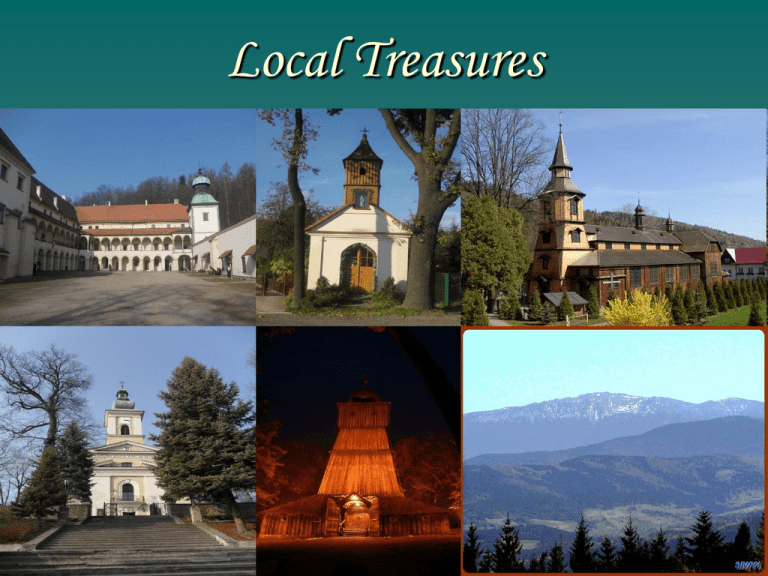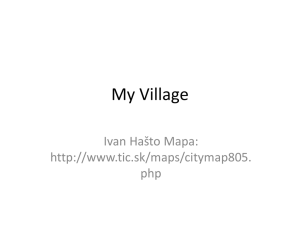Document
advertisement

Local Treasures Sucha Beskidzka Sucha Beskidzka Sucha Beskidzka is a district town located in the picturesque valley of the Beskids. It is the place where the rivers Skawa and Stryszawka meet. The town makes a wonderful base to explore the surrounding mountainous region. Its convenient localization at the intersection of the main arteries passing through Sucha, Kraków, Żywiec and Zakopane, together with the easy access to the Beskids and further to Slovakia have been beneficial to the development of tourism. The town covers the area of 27 square kilometres and has a population of approximately 10 thousand. Photos Sucha was first mentioned in 1405 when it was located according to the Magdeburg law on the banks of the Sucha River, now called the Stryszawka. The first owners were the Słupski family. Historical sources state that in 1554 Gaspare Castiglione, a Florentine goldsmith living in Kraków, bought the place from the family. Ten years later he was officially introduced into the Polish nobility, took on the name Suski and began to bear the Szaszor coat-of-arms. In 1608 Sucha, owned by Piotr Komorowski of the noble clan of Korczak, constituted the center of what was known as "the state of Sucha". The Wielopolski family, the next owners of the settlement, contributed to its economic revival by managing it efficiently and by initiating judicial and administrative reforms. In 1896, at the times of the Branicki family Sucha was granted a town charter. The last owners of the town were the Tarnowskis who left Sucha on the outbreak of the Second World War. In September 1939 the town became a part of the German Reich. After the war the character of the town completely changed due to the industrial and architectonic development. In 1956 the Sucha District was established and in 1964 the town's name was extended to comprise of two elements: Sucha Beskidzka. In 1999 it regained the status of a district town. Photo The Castle The Renaissance palace "Mały Wawel" ranked among the gems of Polish architecture. Primarily designed as a fortified castle and built thanks to the efforts of Kasper Suski, in the years 1608 – 1614. It became later extended into a splendid magnate residence by Piotr Komorowski. The palace took its final shape at the beginning of the eighteenth century. In the clock tower of the palace there is a historic St. Peter the Apostle's chapel. with Old Polish inscriptions. An Englishstyle garden, in which the nineteenth century neo-Gothic orangery and a "Gardener's House" (with a regional chamber) can be found next to the palace. Photos St. Mary’s Church St.Mary's Church was founded by Piotr Komorowski and erected in the years 1613-1614. At the beginning, it was a Gothic single-nave building with Baroque and Renaissance decorations which later became part of a new church built in the years 1895-1907. The latter was designed in an eclectic style by a famous architect Teodor Talowski from Cracow whose job had been commissioned by the Branicki family. Photo Roma Inn The eighteenth century wooden inn situated in the centre of the town. It was in this inn where the devious Mephistopheles took possession of Pan Twardowski's (a legendary sixteenth century nobleman's) soul and where the infamous highwayman Jan Baczyński from Skawica celebrated successful robberies of merchants travelling through the mountain pass of Krowiarki to Hungary along the amber trade rout. Opposite the building stands a fountain featuring a horse (depicted in Sucha's emblem) and the figures of Mephistopheles and Pan Twardowski. Photos Maków Podhalański Filasowa Chapel The Filasowa Chapel was bulit in 1845. It was founded by a marriage couple of Jan Kanty and Regine Filasow. Its shape recalls a presbitery of the local church. There are two very interesting paintings inside the chapel: Madonna with Jesus and Saint Jan Kanty. It is situated in 3-maja Street. Photo Regional Chamber Regional Chamber in Maków Podhalański contains lots of historical photos and documents which are connected to the town, old tools and other things of everyday life of locals (paintings, sculptures, wooden tools, fancy-work). The museum commemorates nazism times in Maków. There is a record telling about killing 42 people during pacification of Zagórze. People who where killed were in the age from of three months to eighty-two. It happened on 4th April 1944. The Chamber is located in a mansion called Paczosówka. The museum was opened thanks to Emil Wacyk and Kazimierz Stopa. It is located in the main street but it is off the beaten path. Photos Sanctuary of Maków Podhalański The Transfiguration Church also known as the Shrine of Our Lady of Nursing of Families, comes from the years 1826-1828. It is a building in the style of late classicism. The main altar is the image of the Virgin Mary Makowski, who was crowned by Pope John Paul II in 1979 during his first pilgrimage to the homeland. The church has a baroque chapel and the chancel walls are the remains of previous church from the XVII century. Photos Kojszówka Kojszówka Kojszówka - a village in Poland located in the Małopolska Province, in the county suski, in the municipality of Maków Podhalański. The village is situated in a Skawa valley, at the foot of Kamienna (719 m) and Mosorowa Góra (691 m), two mountains of Beskid Makowski. Photos The Regional Chamber in Kojszówka It is placed at the local school. There are different kinds of things used by people in every day life. Pupils learn songs, stories and legends connected with tradition and history of Kojszówka. There are also picnics held when you can know the people’s lifestyles. Photo The chapel in Kojszówka Built in the first half of nineteen century. For a long time it was used as a church. In Kojszówka there wasn’t any church. Recently there is a brick chapel. Today the chapel is situated two hundred metres from the church. It’s a little chapel. Photo The church in Kojszówka The Church, as one of the two churches of the parish, belongs to the branch Kojszówka - Wieprzec. Inside tha church there is a painting of Our Lady of Czestochowa. The church was built in 1984-1988. In 1993 it was consecrated by Bishop Albin Malysiak. In 1998 the parish was founded Kojszówka - Wieprzec, formerly the village belonged to the parish in Osielec. Photo The church in Osielec The church in Osielec is dedicated to Saint Filip and Jakub. It’s one hundred eighty years old. Inside the church there are: altar and organs made by folk artists from Waksmund and Lubień. The church was funded by Ludwik Filip Saints-Genois, the owner of village. The parish was eshablished two hundred years ago. Photo Krzeszów Krzeszów Krzeszów is a village in the south of Poland, in the municipality Stryszawa (district Suski, Malopolska province), located just thirteen kilometres west of Sucha Beskidzka. Krzeszów lies at an altitude of 420580 m. above the sea level. In 1340 the number of inhabitants in Krzeszów was about one hundred fifty people. The first sign confirming the existence of the parish in Krzeszów comes from the 1355. However, it is very likely that the parish was founded earlier. Photo The church in Krzeszów In the second half of nineteenth century over two hundred years old church in Krzeszów had to be in bad condition. Unfortunately, there isn’t any picture of this church left. The Katarzyna wooden church was built in 1675 and destroyed in 1905. This church had from the west slopings walls. The ceiling is decorated with the scenes from Katarzyna’s life. 1355 year- first chronicle about parish in the Krzeszów. 1659 and 1664 years- bells appear. 1901 July 30th- pastor Michal Bochenek has begun building the church. Photo Stryszawa Stryszawa The first mention of Stryszawa dates from 1480 . It was founded by the Słupsk Śreniawa family then by the owners of Sucha. In the first half of sixteenth century the village belonged to Stanislaw Slupsk - the owner of Stryszów and Sucha . In the years 1830-1985 in Stryszawa there was a branch of the metallurgical plants of Sucha. Stryszawa was famous for making shingles. To this day its inhabitants are engaged in cottage industry production of small objects of wood, and since the mid-nineteenth century, as toys. In Stryszawa in 1876 was born Kunegunda Siwiec - Servant of God Catholic Church. In the years 1941-1942 the Nazis took away to the General Government nearly 200 families, depriving them of their possessions at the same time. Stryszawa now, due to its location, is a village house. In the area there are numerous hiking trails. Stryszawa municipality belongs to the main centers in Poland Folk Toys. The oldest toys include wheelbarrows, carts, cradles, rattles cube and a carriage with ponies. Then there are horses on wheels, flapping birds and the roosters. Typical for this village birds are roosters, hoopoes, owls, swallows and storks . In 1994 the regional band called "Stryszawskie Gronicki" was founded. It consists of children aged 8-15. The band has performed over 100 times so far. Photos Stryszawa-Siwcówka Siwcówka, lies on the slopes in Żywiecki Beskid. The small village is known thanks to the existing monastery since 1929 Sisters of the Resurrection. In the past it was leading business school for girls, them also an orphanage and a children’s home, which was finally closed in 1960. The monastery was to help rural girls in getting a good education and occupation. In addition to the religions house of the Sisters of the Resurrectionist retreat center where we can find the Fathers of the Resurrection. It is a place of pilgrims of the apostolate prayer groups, health groups and individual travellers who wish to commune with God, rest in the bosom of nature and know the place where there was Cardinal Wyszyński and also Pope- John Paul II. Mansion in Stryszawa Mansion in Stryszawa was built in 1870. It is a brick, plaster building. It has in front of the door a wooden and glass tarrace. Near the building there is a beautiful park. The mansion was taken over by the „City Office Stryszawa”. It is under the highest top of Jalowiec. It was founded in 1929. Kunegunda Siwiec – inhabitant of Stryszawa, took the ground for Stryszawa (to built the Mansion). Lachowice Lachowice Lachowice is a village situated on the border of the Beskid Żywiecki and Beskid Maly mountain ranges, west of the town of Sucha Beskidzka. The history of village dates back to the thirteenth century, when the first settlers arrived there. However, it was not until the late sixteenth century that Lachowice was officially founded. The village was the part of the Domain of Sucha, owned by the Komorowski and Wielkopolski families, who resided in a castle in Sucha. Photos The church in Lachowice The early history of the parish church in Lachowice is connected with the Wielkopolski family. Through the efforts of Teresa Wielkopolsk a parish was established in the village. The church was built in 1789 and consecrated in 1792. The wooden church stands on a hill, among tall trees, and is surounded by a wooden fence with three gates. It has an extremaly picturesque shingle roof. To the west of the church stands a tall tower with sloping walls. The church is surounded by a low, roofed and partially open gallery, called soboty. Inside the church there is a unique double road beam, the top beam with a sculpted crucifix and the bottom with statues of our Lady and St John the Erangelist. In the high altar, consecrated in 1855, there is an image of the Madonna and Child from the seventeenth century. The furnishings of the church are mostly in the late Baroque style and most of them date back to the nineteenth century. Photos Photos Zawoja Zawoja Zawoja is often called the largest village in Poland. The town has a population of just six thousand but stretches along a valley for more than twenty kilometers. There are two main reasons for people to visit Zawoja-in winter the ski slopes atract large crowds, while is summer this is best place from which to explore the nearly hiking trails ,most notable the famous mountain Babia Góra. Zawoja is famous for its wooden architecture and its folk culture. Photo Father’s Carmelitans Barefoots Church At the slope of a mountain,below Magurka and Przysłop,is lifting a church oo. Carmelitans Barefoots. A plan of assumption to church reaches premature years. Under the foundation offered her wealth Maria Bielas at 1948 year. Father Jozef Prus prepared material to build a church. Photo Babia Góra Babia Góra meaning literally Witches’ Mountain,is the highest mountain in Poland outside of the Tatra Mountains. In shape it is more of a hill than a mountain, and for this reason is accesible to more people than some of the rocky peaks in the Tatras. Photo The church of St. Clement in Zawoja The church was built in year, on the place of small church . It was made of timber in the form of cross in 1888. Three towers shoot up on the church. On the highest tower there is a bell. The windows are made according to the project of artist Witold Jańczak, the altar of God Mother was made in 1969 in renaissance and baroque style . Photos Tarnawa Tarnawa In the years from 1772 to 1918 there was Tarnawa Lower Austrian village in Galicia in the circuit Wadowice. In 1867 Lower Tarnawa was connected to the District of Zywiec, and from 1891 belonged to the county of Wadowice. In 1880 the village had 281 houses. Tarnawa was then owned by the count Branicki. The village had two inns, a grange, and exposed brick church on the site of an earlier wooden chapel. This chapel was built in 1845 by John Wielopolski. In the village there was also a school. In the late nineteenth and early twentieth century there was a migration of rural population to America. In 1939, Lower Tarnawa was included in the district of Bielsko in the Reich. The name was changed by the occupiers to Tarnau. In July 1943, the Germans deported villagers to forced labor camps in the Reich, and in their place were brought German settlers. Since the end of the war in 1945 to 1975 Tarnawa was lower in the province of Cracow. In the years 19751998 a town was located in the province of Bielsko. In 1959 the Bishop Karol Wojtyla, later our Pope, has devoted murals and stained glass windows in the local church. Photos






